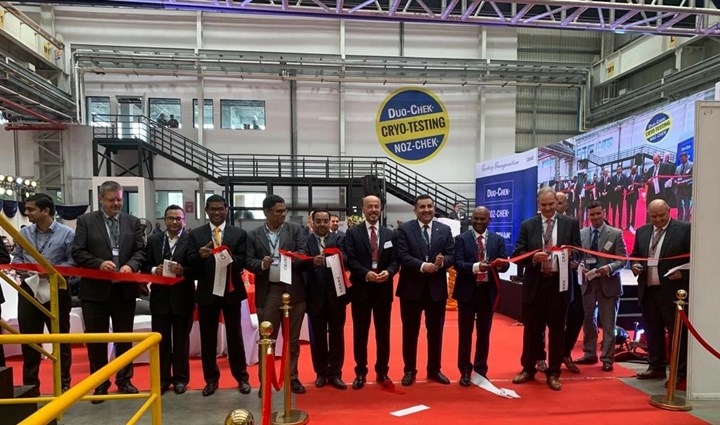Crane Inaugurates New Check Valve Facility in India
The new state-of-the-art manufacturing facility features automated welding technology to manufacture a full range of Noz-Chek and Duo-Chek valves in sizes up to 84 inches.
#VMAnews #gate-globe-check
Crane inaugurates its new engineered check valves facility in Maharashtra, India.
Photo Credit: Crane ChemPharma & Energy
Crane announced the opening of its new engineered check valve factory in Satara, Maharashtra, India. The event was hosted by Crane Process Flow Technologies India Private Limited and ChemPharma & Energy, Duo-Chek and Noz-Chek, businesses of Crane Co. Led by Mr. Hari Jinaga, the President of Crane India, with customers, business partners, and other global leaders of Crane present. The ceremony included presentation of the new plant capabilities that will be completely dedicated to its engineered check products. Crane’s precision engineering and decades of research have come together at every step in the new state-of-the-art approximately 110,000 sq ft manufacturing facility featuring automated welding technology to manufacture a full range of Noz-Chek and Duo-Chek valves in sizes up to 84 inches.
The plant meets the stringent quality and product approvals and is capable of in-house machining for all offered size ranges. The facility offers in-house high-pressure gas and cryogenic testing for valves up to 72 inches. Certified testing is also available per customers’ specific temperature or pressure requirements, detailing leak rates as well as a graphical representation of the testing cycle.
The new facility holds direct employment for approximately 100 associates, who support the requirements of a variety of industries within the chemical processing, oil and gas, petrochemical, and energy sectors including renewable energy, and other emerging markets, such as hydrogen production.
“Crane India has been an influential force in the country through our contributions and investments in local communities over the past 30 years,” said Hari Jinaga, president of Crane India. “Along with the new Engineered Check Valves factory inauguration, today we have also reaffirmed our partnership with the local NGO Maher by opening the next building within the Crane-funded Maher Home complex for disadvantaged children in Satara. The facilities that have been built here in Satara are best-in-class; our new Engineered Check Valves factory reflects digital transformation trends and features a fully automated manufacturing process to ensure our products maintain the quality Crane is known for. ”
The new facility will employ up to 100 associates, and will support a variety of industries within the chemical processing, oil and gas, petrochemical, and energy sectors including renewable energy, and other emerging markets, such as hydrogen production.
Additional information and a video from the event are available on Crane CP&E and Crane India’s LinkedIn pages.
RELATED CONTENT
-
ValvTechnologies and Severn Form Strategic Partnership
ValvTechnologies and Severn Glocon have reached a partnership agreement that will see collaboration between two of the world’s leading engineering and manufacturing companies specializing in innovative, high-end, severe-service valves.
-
An Interview With ... Matt Thiel
Matt Thiel, president of AUMA Actuators, was named chairman at VMA’s 2022 annual meeting.
-
Valves in Oxygen Service
In his presentation at VMA’s 2017 Technical Seminar, Kurt Larson, a process control engineer for Air Products, spoke about the inherent danger of the oxygen production business and how it is particularly important for end users and valve manufacturers to work closely together.











 Unloading large gate valve.jpg;maxWidth=214)